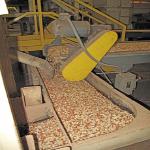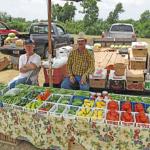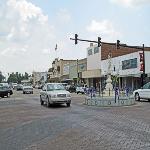10 August 2010
While many U.S. cities have suffered because of the recession, one town in the southern state of Alabama, has fared surprisingly well. The town of Enterprise has applied a turn-of-the-century economic lesson, learned from an agricultural pest.
Like many American small towns, Enterprise, Alabama has a monument in the middle of Main Street. But it's not a statue of a Civil War general, or a local lawmaker. It's a statue of a woman with white robes and long hair.
Her arms are thrust high into the sky, and she holds aloft a giant black bug.It's a boll weevil.
Ironic tribute
Almost a century ago, this small, voracious beetle migrated north from Central America, eating its way through U.S. cotton fields. Swarms of boll weevils destroyed two-thirds of the cotton crop in this region.
But soon after, the town built a monument to honor the bug. Local historian Scott Smith points out the irony.
"How a pest that really caused so much economic hardship, oddly contributed to great changes in agriculture and to the prosperity of this region."
When boll weevils destroyed the cotton harvest in 1915, it was devastating. Until then, cotton had been the region's largest crop. But the infestation actually gave local farmers an opportunity to try something new. They planted a different crop the boll weevil couldn't harm: peanuts.

VOA - A. Boiko-Weyrauch
After boll weevils destroyed the cotton crop, Enterprise soon produced more peanuts than any other region in US.?
Thriving new industry
Today, a few blocks up from the Boll Weevil Statue, conveyor belts carry rivers of peanuts to be cracked and ground at the Sessions Company. Chairman Mo Sessions' great-grandfather was the first person to make peanuts profitable in Enterprise.
"He heard that peanuts were an alternative to cotton," Sessions explains. "And so he procured some peanut seed and planted peanuts in the summer of 1916. So ever since then our family has been in the peanut business."
By 1919, the region produced more peanuts than any other in the U.S. - bringing in millions of dollars to the local economy. But farmers had learned the hard way they couldn't rely on just one crop, so they planted more corn, peaches, and figs.

VOA - A. Boiko-Weyrauch
After the boll weevil destroyed the cotton crop, farmers diversified, deciding never to rely on just one crop.More diversity
As the decades went by, other non-agricultural industries came to Enterprise, including the U.S. Army.
Every day helicopters from an army post right outside town fly overhead. Fort Rucker is the center for the Army's helicopter training school. Some people call the place 'Mother Rucker' because so many aviators cycle through its gates.
Deputy Garrison Commander, Justin Mitchell, says that traffic means income for the surrounding communities. "Military folks move every two years generally, two to three years, and so that turnover and that constant influx of buying houses, buying cars, buying clothes for schools, is just a huge impact to the Enterprise community."
Fort Rucker employs 14,000 civilians and contractors. Soldiers in military fatigues are a common sight on the streets of Enterprise, shopping at local businesses and restaurants. Mitchell says Fort Rucker contributes one billion dollars a year to the region.

VOA - A. Boiko-Weyrauch
Enterprise has one of the strongest economies in Alabama.A strong economy
Phil Thomas, president of the Enterprise Chamber of Commerce, notes proudly that for the past two years, his town has had one of the strongest economies in Alabama.
"Everyone's unemployment rates have gone up in the past year, year and a half. Relatively speaking, ours have been very low. We have remained the third lowest unemployment rate in Alabama for six to nine months now."
Thomas says Enterprise learned to be strong from the Boll Weevil. The pest taught the town the value of a diverse economy.
"Agriculture, the military, the business community, industry, and service jobs all take about 20 percent of our economy, so it's really good for us because if one sector is a little bit slow or has a downturn, the other sectors can pull it out."
Today, the boll weevil has been eradicated from the fields of the southern United State. But the insect still holds an honored place in Enterprise: in the monument on Main Street; in the hearts of the residents of Enterprise; and, in its own way, in the local economy.